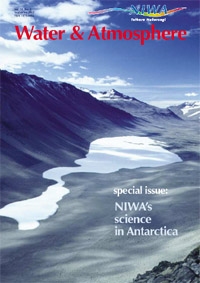
Antarctic researchers worldwide are familiar with the acronym SCAR – the Scientific Committee on Antarctic Research. SCAR has facilitated and coordinated research in Antarctica for the past 45 years and in doing so has become a model for international collaboration in science. A symbol of its standing is that in 2002 SCAR was awarded the prestigious Prince of Asturias Award for International Co-operation. It is the first science body ever to have received this award.
SCAR was set up in 1958 under the International Council for Science to oversee the research of the 12 nations then active in Antarctica. The timing was significant because it was International Geophysical Year. It was also the year in which New Zealand established Scott Base.
Today there are 27 full member nations of SCAR and the committee itself is made up of delegates from each country. Delegates generally lead national Antarctic science committees in their respective countries; in New Zealand this is the Royal Society Committee on Antarctic Sciences. Within their local settings, all SCAR member countries (and additional associate members) work towards the design and promotion of collaborative, interdisciplinary science programmes that place Antarctica in a global setting.
As well as overseeing research in Antarctica, SCAR provides independent (non-government) scientific advice to the Antarctic Treaty System (ATS) on a range of topics, particularly environmental issues. The ATS is the international body made up of the nations that have signed the Antarctic Treaty and which effectively looks after the governance of Antarctica.
From the beginning, New Zealand has been very active in SCAR. New Zealanders have held the positions of SCAR President (Professor G. Knox), several Vice Presidents (including authors of this article), and currently as secretary of the Geoscience Group (Professor B. Storey, University of Canterbury) and chair of the group on Antarctic Data Management (Dr D. Peterson, Antarctica New Zealand).
SCAR will continue to be an important link for New Zealand to join international science programmes, for staging of Antarctic symposia in New Zealand, and as a forum for New Zealand scientists to voice opinions and concerns about the frozen continent.
Clive Howard-Williams, NIWA Fred Davey, GNS (Institute of Geological and Nuclear Sciences)
